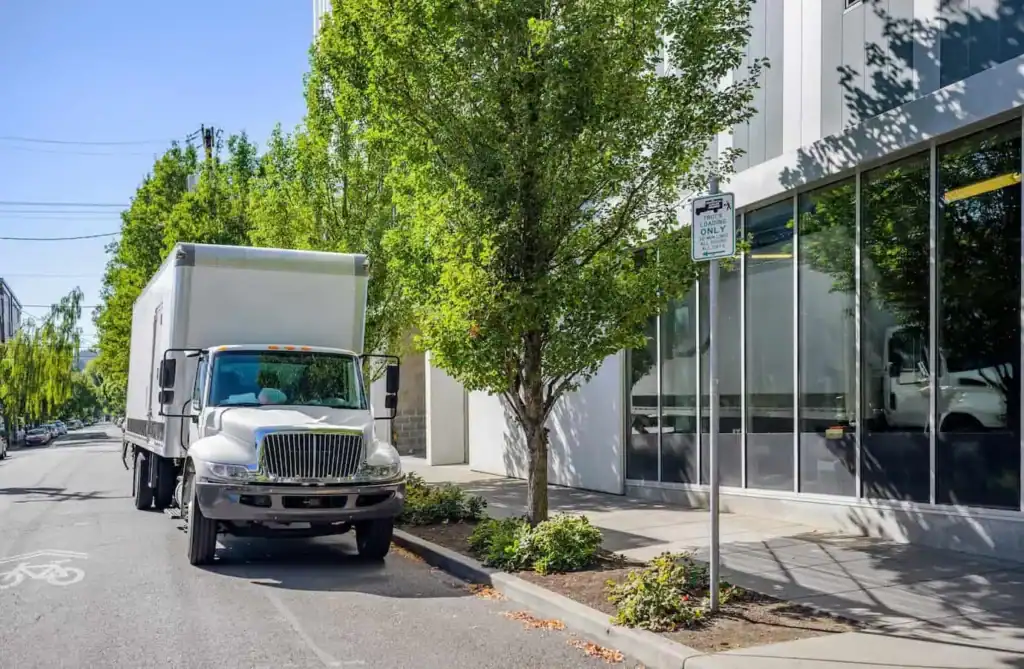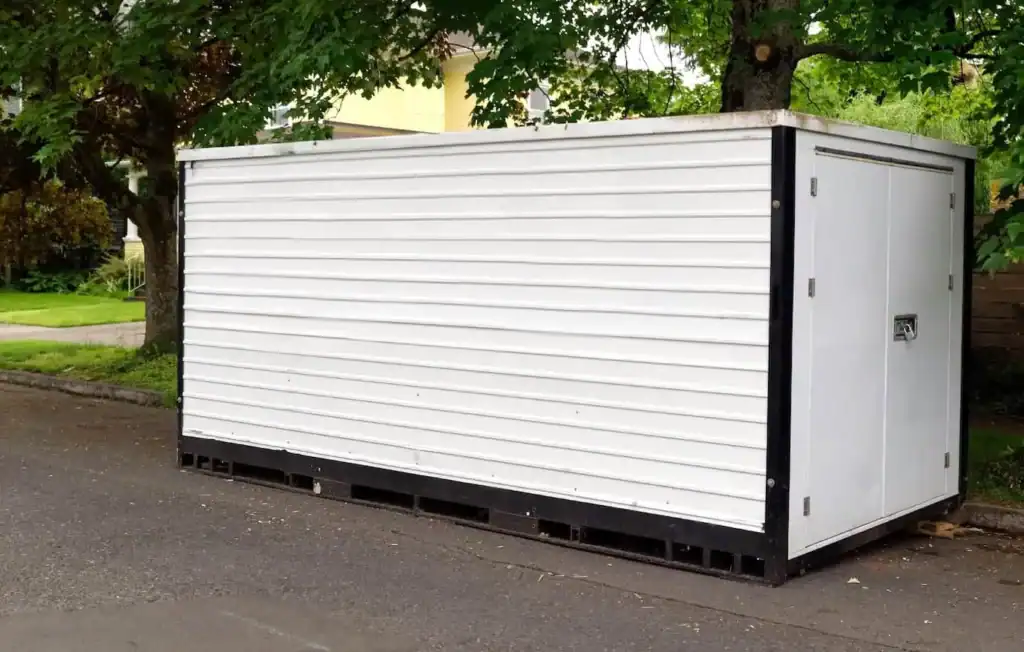Between trucks, containers, and everything in between, sorting through moving options can feel overwhelming. It’s tough to know what’s worth your time and money. Both moving trucks and moving containers like PODS have their advantages, depending on your budget, timeline, and how much of the work you want to do.
In general, a moving truck is best if you want the lowest upfront cost, while a moving container is better if you want to work on your own schedule and avoid driving. In this guide, we’ll break down costs, convenience, flexibility, and real-world scenarios to help you figure out which option best fits your move.
Table of Contents
Moving Trucks vs. Moving Containers At a Glance
Both moving trucks and moving containers cover the same basics: you pack up your things, they get transported, and you unload at your new place. The big difference is how much of the job you take on yourself.
A truck makes you the driver, navigator, and timekeeper. It’s usually the cheapest route, but it comes with a tight return deadline and driving a bulky rental.
In contrast, a container gets dropped off at your door, you load it when you’re ready, and the company handles the driving, so you don’t have to drive 20-foot truck through traffic.
| Feature | Moving Truck | Moving Container |
| Cost | Usually the cheapest option upfront | Higher base cost, but includes transport |
| Driving | You drive and return the truck | Company delivers and picks up the container |
| Flexibility | Tight rental windows and late fees | You load/unload at your pace |
| DIY Involvement | Full DIY (unless you hire labor) | Partial DIY, no long-distance driving |
Moving Trucks Overview
Most families start by booking a truck when they’re planning a DIY move. Rental trucks are easy to book and an affordable choice if you’re watching your budget. Keep in mind that you’ll be in charge of driving, gas, and making sure it’s back on time.
That can feel like a lot of pressure, but many families find the savings worth it. In the right situation, renting a truck can cut your moving costs and still give you the control you want on moving day.
Average Moving Truck Costs

Here’s what most people spend on rental trucks once you factor in the base fee and typical fuel costs. These numbers are averages across U-Haul, Budget, and Penske, so your total can shift depending on where you’re moving and the time of year.
- Local: ~$167
- Regional/next state over: ~$200
- Cross-country: ~$4,125
These numbers will depend on location and season, mileage, fuel prices, vehicle size, add-ons (insurance, dollies, pads), and late fees.
Want a deeper look at rental prices? Check out our breakdown of how much a U-Haul really costs.
How Moving Trucks Work
Renting a moving truck is easy: You reserve a vehicle online or by phone, choose your pickup and return locations, and select either a one-way or round-trip rental. The base rental covers a set time period, but most companies tack on charges for mileage, gas, and any extra equipment like dollies or furniture pads.
“Local rentals are inexpensive — often under $200 plus gas — and trucks are widely available. If you’re moving a studio or 1-bedroom, a 10-15-foot truck gets the job done in a single trip.”
From there, you’ve got options. You can load the truck yourself or hire hourly labor to do the heavy lifting. You can drive it yourself or even hire a licensed driver if you’re not comfortable on the road. That flexibility is part of what makes cost comparisons tricky — no two rentals look exactly the same once you layer in miles, fuel, labor, and add-ons. If you’re weighing your options, here’s a step-by-step guide to finding the best rental truck for your move.
Major Moving Truck Companies
Three truck rental companies dominate the U.S. market:
- U-Haul: The largest fleet and most locations nationwide. Usually the cheapest option, but reviews are mixed and depend on your location due to variable truck conditions and customer service.
- Budget Truck Rental: Known for frequent discounts and promotions. Availability can be limited in smaller cities.
- Penske: Typically higher daily rates, but newer trucks and more consistent reviews. Often the most reliable option for long-distance drives.
All three share some common issues: fee structures that can be confusing, plus plenty of negative reviews from customers surprised by mileage costs or hidden charges. Availability and pricing are the key differentiators, so it’s worth comparing all three before booking.
Pros of Moving Trucks
- Lower upfront costs for short-distance moves: Renting a truck for a local move is often the cheapest way to get your belongings from one home to another.
- Flexible pickup and drop-off: With thousands of rental locations, you’ll usually find a truck nearby.
- Wide size range: Trucks range from 10-foot vans perfect for studio apartments to 26-footers for larger homes.
- Total control: You set the schedule, you control the pace, and you decide whether to bring in help.
- One-way rentals available: For long-distance moves, most companies let you pick up in one city and return in another.
- Immediate availability: Because the fleets are so large, you can often book a truck last-minute.
- Optional add-ons: You can rent moving blankets, dollies, or a trailer for your car, all in one place.
- Predictable experience: The process is straightforward: reserve, pick up, drive, return.
Cons of Moving Trucks
- You’re the driver: Not everyone feels comfortable navigating a 20-foot truck, especially through busy city streets or on cross-country highways.
- Mileage and gas fees add up: The base rental price can look low, but fuel and per-mile costs push the total much higher.
- Time-sensitive rentals: Trucks must be returned by a strict deadline, or you’ll rack up late fees fast.
- Wear and tear: Customer reviews often mention older trucks or unexpected maintenance issues that can add stress on moving day.
- Parking and permits: Finding space for a large truck can be a headache, especially in urban areas.
- Hidden fees: Insurance, cleaning, and late return charges can make the final bill higher than expected.
- Physical effort required: Even if you hire help, you’ll still be responsible for some heavy lifting and coordination.
- No storage included: Unlike containers, trucks don’t give you built-in storage time — everything has to be loaded, moved, and unloaded on the same timeline.
Moving Containers Overview

Moving containers like PODS are the middle ground between renting a truck and going full-service. A container gets delivered to your driveway, you load it on your schedule, and the company hauls it to your new home. That convenience means you don’t have to worry about driving a bulky vehicle long distances, but you’ll pay more upfront than for a truck rental.
For many moves, especially long-distance ones, containers strike a balance between cost, flexibility, and less stress. Here’s a snapshot of what you can expect:
Average Moving Container Costs
Container pricing looks higher at first glance, but it usually bundles in transportation and at least a month of storage. The averages below come from PODS, Pack-Rat, and U-Haul U-Box quotes, giving you a sense of what to expect at different distances.
- Local: ~$589
- Regional/next state over: ~$665
- Cross-country: ~$4,531
These numbers will depend on container size and count, market availability, season, storage duration, access/re-delivery, permits for street placement, and distance.
Moving Container Overview
A moving container is about as simple as it sounds. You set up a delivery date, and the company drops the container outside your home. It stays there for several days — sometimes longer — so you can load it when you have time and at your own pace. When you’re ready, the company comes back, picks it up, and either drives it to your new place or stores it until you need it again.
Costs usually cover the delivery, pickup, and transport. Many companies also include the first month of storage, which is helpful if you’re between homes. Just like with a truck, you can load everything yourself or hire movers to do the heavy lifting. That flexibility is why prices can swing so much. A small apartment move may be fairly affordable, while a big cross-country move with storage can get expensive fast.
Major Moving Container Companies
Several companies dominate the container market:
- PODS: The name most people know. Steel containers, lots of coverage, solid reliability, and usually on the higher end of the price range.
- U-Haul U-Box: Cheaper upfront and easier to book for smaller moves. Containers are made of wood, which not everyone likes.
- 1-800-PACK-RAT: Similar to PODS but often a little less expensive. Availability is hit-or-miss depending on where you live.
Across the board, reviews are mixed. Customers often mention billing issues or unclear fees, though the service itself is fairly consistent. The biggest differences are in container durability, price, and where each company operates. Curious about PODS in particular? We’ve got a full PODS 101 guide that walks through container sizes, pricing, and policies.
Pros of Moving Containers
- Delivered to your door: You don’t need to drive or return anything.
- No driving required: The company does all the hauling, even cross-country.
- Pack on your schedule: You usually get days, sometimes weeks, to load.
- Storage included: Many plans come with a month of storage at no extra charge.
- Good for long-distance: Less stress than driving a truck, and fewer chances for damage.
- Expandable: You can order more than one container for larger homes.
Labor help available: Hire movers just to load and unload if you want a middle ground.
For more details, here’s our roundup of the cheapest moving container companies and what to know before booking.
Cons of Moving Containers
- Higher cost: More expensive than renting a truck, especially for local moves.
- Limited availability: Bookings fill up quickly in the summer.
- Parking space required: You’ll need a driveway or city permit.
- Delivery windows: Timing isn’t always exact.
- Extra charges: Additional storage, reschedules, or multiple pickups add up.
- Size limits: Easy to underestimate how much space you’ll need.
- Less control: Once it’s gone, you’re on the company’s schedule.
Moving Trucks vs. Moving Containers Cost Overview
The main thing you’ll need to know is that moving trucks are cheaper upfront, while moving containers cost more but include transport and often storage.
Average Moving Costs by Type
| Moving Trucks | Moving Containers | |
| Average Cost for a Local Move | $167 | $589 |
| Average Cost for a Long-Distance Move | $200 | $665 |
| Average Cost for a Cross-Country Move | $4,125 | $4,531 |
These are blended averages from secret-shop quotes across major brands and markets. Your total can swing based on where you live, the time of year, fuel prices, the exact mileage and size you choose, and whether you add storage or extra services.
Breaking it down:
- Local moves: Renting a truck for a small apartment often lands in the $167 range once you add mileage and fuel. A container for the same move is usually closer to $589. The upside is you get several days to load, instead of having to do it all in one go.
- Long-distance moves: Take a two-bedroom move from Tampa to Atlanta, about 460 miles. A truck costs around $200 for truck rental (plus gas), while a container averages closer to $665.
- Cross-country moves: Moving a three-bedroom from New York to Los Angeles can top $4,125 in a truck, plus gas. A container for that same trip generally falls between $4,531 and $4,579, depending on size and whether you need storage.
- Hidden fees: With trucks, expect extra charges for fuel, mileage, insurance, and late returns. With containers, costs climb if you need more storage time, extra pickups, or city permits for parking.
Which Option Is Best for Your Move?

Choosing between a moving truck and a moving container often comes down to your priorities: cost, distance, storage needs, and how much hassle you want to avoid. Here’s how each option stacks up depending on your situation.
Best for Local Moves
For short hops across town, a moving truck usually wins. Local rentals are inexpensive — often under $200 plus gas — and trucks are widely available. If you’re moving a studio or 1-bedroom, a 10-15-foot truck gets the job done in a single trip.
Containers can still work for local moves, especially if you want the convenience of loading over several days. But for most small, same-city relocations, trucks are cheaper and faster.
Our take: A moving truck is the more cost-effective choice for local moves.
Best for Long-Distance Moves
Driving a truck hundreds of miles can be stressful and expensive once you add fuel, mileage, and insurance. Containers take that pressure off: the company hauls your stuff for you, and many include a month of storage in the price. For 500–2,000-mile moves, containers often provide the best balance of cost and convenience.
Trucks may still come out cheaper for lighter loads, but you’ll need to factor in road fatigue and logistics like returning the vehicle in another city.
Our take: A moving container like PODS is usually the smarter choice for long-distance moves.
Best for Storage + Moving
If you need storage between homes — say you’re waiting on a lease or closing date — containers shine. Most companies include 30 days of storage, and you can extend it for a fee. That means your belongings stay packed and secure without needing to unload into a separate storage unit.
“That flexibility [of rental trucks] is part of what makes cost comparisons tricky — no two rentals look exactly the same once you layer in miles, fuel, labor, and add-ons.”
Trucks, on the other hand, don’t include storage. You’d need to unload everything into a unit, then reload it later, doubling the work.
Our take: A moving container is best if you need both moving and storage in one solution.
Best for Tight Budgets
When money is the deciding factor, moving trucks almost always come out ahead. A local truck rental is often half the price of a container, and even long-distance moves can cost thousands less.
That said, it’s worth running the numbers before you book. Once you add in fuel, mileage, insurance, and other fees, a truck isn’t always the cheapest option. In some cases, a container or even a freight trailer may come out ahead once you compare the full totals.
The trade-off: you’re paying with your time, labor, and the stress of driving. If you’re comfortable handling the logistics, a truck is the most budget-friendly path.
Our take: A moving truck is best if keeping costs low is your top priority.
Alternatives to Consider
While moving trucks and moving containers are the most common DIY-friendly choices, they’re not the only ways to relocate. Depending on your budget, distance, and comfort level, one of these alternatives might fit better:
- Freight trailers: A large trailer is dropped at your home, you load it, and the freight company drives it to your destination. Pricing is usually based on how many linear feet of the trailer you use. It’s often cheaper than full-service movers for long distances, but less flexible than a container.
- Full-service movers: If you’d rather skip the heavy lifting, hiring a professional moving company to pack, load, transport, and unload everything is the most hands-off option. This is usually the priciest choice, but it saves time and stress, especially for large households.
- Labor-only help: Not an alternative for transport, but worth mentioning. You can pair hired movers with your own truck or container rental to cut down on the work without paying for a full-service package.
Each option has its place. Freight trailers work well for big, long-distance moves, full-service is best for maximum convenience, and labor-only help is a smart add-on if you want muscle without the high cost.
Final Thoughts
Both moving trucks and moving containers can get the job done — the right choice depends on what matters most to you. Trucks are usually the cheapest way to move, especially locally, but they put you in charge of driving and logistics. Containers cost more, yet give you the gift of time and let someone else handle the road. No matter which path you choose, planning ahead and comparing quotes will help you save money and stress. With the right fit, your move can feel a whole lot smoother.
Other Helpful Articles:

